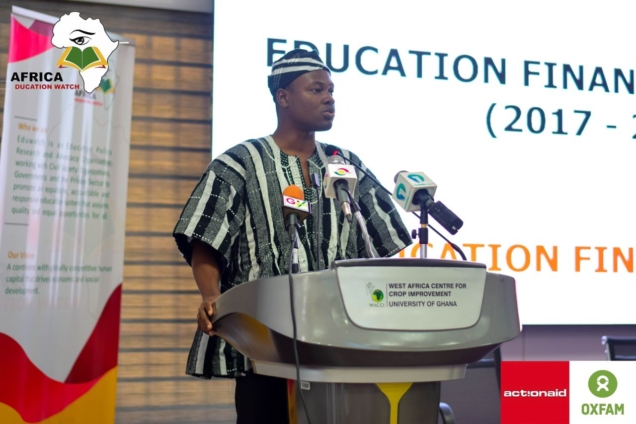As the 2024 elections approach, civil society organisations are intensifying their calls for greater transparency and accountability in the education sector.
Africa Education Watch (EduWatch), supported by Oxfam and ActionAid, recently hosted its Annual Education Financing Conference to present a comprehensive report on education financing from 2017 to 2024.
The conference, held on August 29, 2024, at the West Africa Centre for Crop Improvement (WACCI) at the University of Ghana, highlighted the urgent need for stronger financial commitment and effective allocation of resources in the education sector.
The report critically evaluates the government's financial contributions to education over the past seven years, comparing them to international standards.
Divine Kpe, Snr Programme Officer of Eduwatch noted that GDP allocation between 2014-2024 is averagely 4% while the percentage of total annual expenditure is averagely 7%.
He pointed out that while the 4% allocation meets the lower threshold, it remains inadequate for addressing the sector's needs, urging the government to aim for the higher end of the benchmark to ensure sufficient funding.
Budget credibility also emerged as a significant concern.
Mr Kpe explained that although budget allocations for initiatives like the Free Senior High School (FSHS) program and capitation grants may seem adequate on paper, actual disbursements often fall short.
He noted that the FSHS program's budget credibility has decreased from 120% in its initial year to just 61% recently.
“The feeding grant for special schools has also faced delays, and it is crucial to highlight these issues to ensure that attention is directed toward resolving them,” he added.
The report also criticised the government’s funding approach for Technical, Vocational, Education, and Training (TVET), which receives only about 8% of total education expenditure.
Mr Kpe called for a distinct financing model for TVET to address its capital-intensive nature and improve practical training and enrollment.
“To effectively support TVET, we cannot apply the same financing model used for the FSHS program,” he said.
“There is a pressing need for a dedicated financing model for TVET to tackle its unique challenges and enhance the quality of technical education in Ghana.”
Latest Stories
-
EPA says lead-based paints are dangerous to health, calls for safer alternatives
35 minutes -
Queenmother calls on President-elect Mahama to appoint more women in his government
3 hours -
Atletico Madrid beat Barcelona to go top of La Liga
3 hours -
Usyk breaks Fury’s heart with points win in rematch
3 hours -
Ghana-Russia Centre to run Russian language courses in Ghana
8 hours -
The Hidden Costs of Hunger: How food insecurity undermines mental and physical health in the U.S.
9 hours -
18plus4NDC marks 3rd anniversary with victory celebration in Accra
12 hours -
CREMA workshop highlights collaborative efforts to sustain Akata Lagoon
12 hours -
2024/25 Ghana League: Heart of Lions remain top with win over Basake Holy Stars
13 hours -
Black Queens: Nora Hauptle shares cryptic WAFCON preparation message amid future uncertainty
13 hours -
Re-declaration of parliamentary results affront to our democracy – Joyce Bawah
13 hours -
GPL 2024/25: Vision FC score late to deny Young Apostles third home win
14 hours -
Enhancing community initiatives for coastal resilience: Insights from Keta Lagoon Complex Ramsar Site Workshop
14 hours -
Family Health University College earns a Presidential Charter
14 hours -
GPL 2024/25: Bibiani GoldStars beat Nsoatreman to keep title race alive
14 hours

